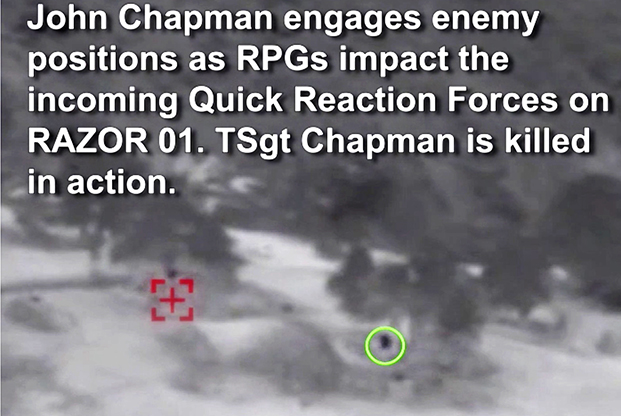
A still image from a grainy Predator video shows Chapman, circled in green, during the battle on a mountainside in Afghanistan, fighting for his life and the lives of his teammates. Video: USAF
Gen. David L. Goldfein, Air Force Chief of Staff, has a large framed picture of a sergeant on his Pentagon office wall. It is, naturally, not just any sergeant. It is John Chapman, the combat controller killed in March 2002 while fighting entrenched al Qaeda terrorists high in the mountains of Afghanistan.
Nearby, in Goldfein’s office sitting area, a propeller blade is mounted on the wall. This is the propeller from the MQ-1 Predator aircraft that flew over Chapman, “in his last hours, while he was fighting the enemy,” Goldfein told Air Force Magazine in a recent interview.
Video from this Predator captured Chapman’s extraordinary heroism, which eventually led to Chapman’s Air Force Cross being upgraded to a Medal of Honor—the nation’s highest award for valor in combat.
The Predator, orbiting overhead, showed Chapman repeatedly attacking enemy positions. He was hit by enemy fire and presumably knocked unconscious. Later, when he recovered enough to resume fighting, he did exactly that—again attacking enemy positions at close range.
“As he fought his way to his death on that mountaintop, he did so to protect his teammates,” Goldfein said. “He did that in as tough an environment as one could ever imagine, and he refused to stop until the very end.”
“When we see these young airmen like John Chapman [exhibit] extraordinary courage under the worst conditions,” it is an inspiration to all airmen, Goldfein said.
Chapman’s example resonates in today’s Air Force, which has been at war nonstop since 1991. Even the terror attacks of 2001 are now 17 years in the past. Some 96 percent of today’s Air Force joined after 9/11, which means “the vast majority of airmen … have never actually known a day of peace,” Goldfein observed.
“Probably the most important thing we can do to keep people in the United States Air Force … is to put in inspirational commanders and leaders, both officers and NCOs,” Goldfein explained. The wrong leaders create hostile environments and send airmen heading for the exits.
“Our airmen are far too smart to walk by or not see a say/do gap,” Goldfein said, referencing leaders who would tell their subordinates one thing but behave differently. “If they see me saying one thing and doing another they’re going to see right through it.”
The Air Force recognizes the importance of leadership by example at all levels—from NCOs, to squadron commanders, to generals—and is working now to find and develop the 21st century leaders it needs.
USAF asks much of its airmen and families, so “this to me is nothing short of a moral obligation, to make sure we put the best leaders in place,” he said.
The corollary is that abusive, toxic, autocratic leaders are not going to find success in today’s Air Force.
“There was a period of time in our Air Force some years ago where the autocratic phone slammer [was] able to survive,” Goldfein said. “My sense is that that kind of leadership will not survive … anymore.”
At the end of the day, he said, officers and NCOs are graded on two things: character and competence. Many airmen honored for valor in recent wars humbly say they were just doing their jobs, and anyone in the same situation would have done the same thing. The right leaders rally the troops behind them and create a culture in which airmen will eagerly go the extra mile to ensure success, whatever the mission might be.
“When it comes down to it, you’re looking to your left and to your right and saying, ‘please God, don’t let me let my buddies down,’?” Goldfein said.
Although “only” a tech sergeant, subsequently promoted to master sergeant, Chapman led by example. He did not let his buddies down.
“We may look at what John did and say he is a hero, but then we are not one of his team or the other teams that go in where angels wouldn’t tread,”
Chapman’s father, Gene Chapman, wrote to his son’s squadron commander after his son was killed.
“John is proud to be part of you, and if you could ask him right now, he would tell you what he did was for his family, friends, and the teams he worked with.”
The Air Force is blessed to have airmen like Chapman, those willing to put others first regardless of the circumstances. May the Air Force continue to attract and develop America’s best, men and women who will lead by example.